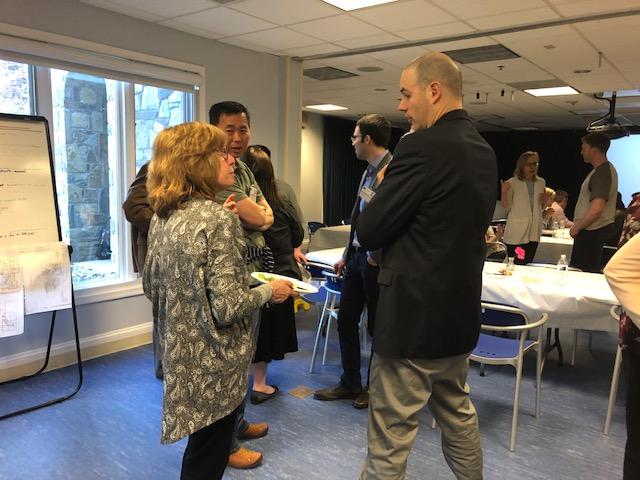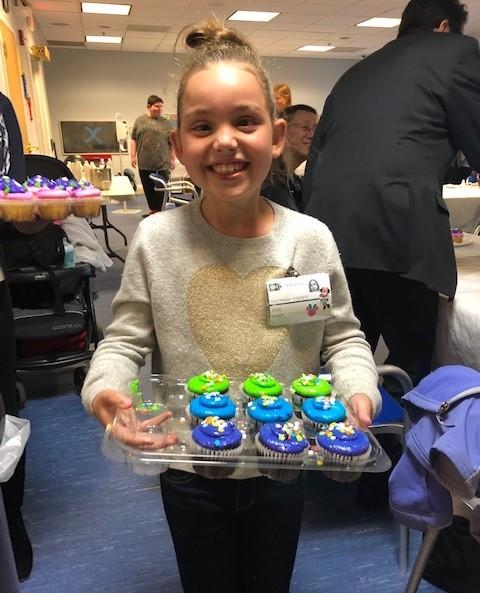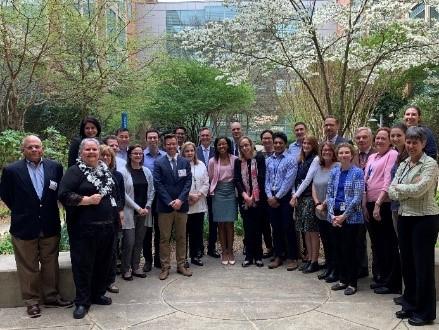The My Pediatric and Adult Rare Tumor (MyPART) Network aims to engage patients in rare tumor research and connect them to a network of advocates, physicians, and researchers to develop effective therapies and improve rare cancer patient care.
Chordoma is a rare type of cancer that grows along the spinal column, particularly at the base of the skull and near the tailbone. Only about one per one million people per year are diagnosed with chordoma, which translates to about 300 adults and 30 children in the U.S. and 700 people throughout Europe diagnosed each year. Chordoma is often difficult to treat due to the location of the tumors. In about 30-40% of cases, the cancer can metastasize.
MyPART staff collaborated with the Chordoma Foundation to host the first pediatric and young adult Chordoma Clinic at NIH on April 16th – 18th, 2019. The mission of the first clinic was to:
- Bring together pediatric and young adult chordoma patients with expert health care providers and patient advocates.
- Take advantage of NIH resources to expand basic and clinical research on pediatric and young adult chordoma.
- Facilitate communication and collaboration between clinical researchers interested in developing treatment for pediatric and young adult chordoma.
Patients were identified by experts working in the field of pediatric chordoma and by patient liaisons at the Chordoma Foundation. Patients were recommended for the clinic based on the complexity of their case and their need for advice on treatment options.
An expert panel of clinicians from both inside and outside NIH met with each of the patients and their family members to discuss their medical history and treatment options going forward. The MyPART clinical team collected biospecimens, patient-reported outcomes, pathology and imaging records, and medical histories as part of the Natural History of Rare Solid Tumors and the Natural History of Chordoma protocols. Patients met with a genetic counselor and psychologist, as well as specialists at the NIH Clinical Center tailored to each patient’s needs who responded to patient questions. Some early key findings from the Chordoma Clinic were:
- Several patients did not receive the right diagnosis initially and had great difficulty in getting the correct diagnosis and expert care.
- To get the best treatment for chordoma, most patients had to travel far from home and find clinicians with experience in treating chordoma. Often, they needed to see experts at multiple institutions in different states.
- Patient families often became experts in the disease, having more knowledge than the home medical team on the state of the art in treatment.
Analysis of patient clinical information, patient-reported outcomes, and biospecimens is ongoing.
For patients and families, the Chordoma Clinic was an opportunity to meet with the “dream team” of chordoma experts, as Mr. Frank Fernandes refers to them. Mr. Fernandes’s son was diagnosed with chordoma in 2010 and, after a long journey with chordoma, is now cancer free. Mr. Fernandes explained the importance of coming together to share information and their experience with chordoma. When Mr. Fernandes and his family received the invitation to attend the clinic and enroll in the natural history study, they “felt like, here is another tool we can add to the toolbox,” Mr. Fernandes explained. The way he views it, his son’s participation in the natural history study could provide another resource to add to the “toolbox” of chordoma research.
In addition to the unique opportunity to bring chordoma patients together with a panel of experts, the Chordoma Clinic provided patients and families the opportunity to meet and bond with each other. For most patients, this was the first time they had met someone else with chordoma. During a dinner on Tuesday night at the Children’s Inn, patients and families were able to spend time together and share their experiences.
The success of the Chordoma Clinic highlights the need for close collaboration between patients, physicians, and advocates to advance understanding and treatment of rare cancers. Rare cancer clinics provide a unique opportunity to foster this collaboration, and MyPART will continue to host rare cancer clinics in the effort to engage patients in rare cancer research and discover new therapies.
Patients, families, physicians, and advocates enjoyed a welcome dinner on April 16th before the start of the Chordoma Clinic.
We thank all of the patients, families, and advocates who participated in the Chordoma Clinic!
Chordoma Clinic group, April 2019
In addition to the NIH/NCI multidisciplinary team; extramural experts present during the clinic were:
- Dr. Gregory Cote (Medical Oncology, Massachusetts General),
- Dr. Paul Gardner (Neurosurgery, University of Pittsburgh)
- Dr. Christopher Heery (Medical Oncology, Bavarian Nordic)
- Dr. Norbert Liebsch (Radiation Oncology, Massachusetts General)
- Dr. Robert Malyapa (Radiation Oncology, University of Maryland)
- Dr. Debraj Mukherjee (Neurosurgery, Johns Hopkins University)
- Dr. Deric Park (Neurology, University of Chicago)
- Dr. Nick Rowan (Otolaryngology, Johns Hopkins University)
- Dr. Carl Snyderman (Otolaryngology, University of Pittsburgh)
We thank each of the extramural experts who participated to make the inaugural Chordoma Clinic a success.


